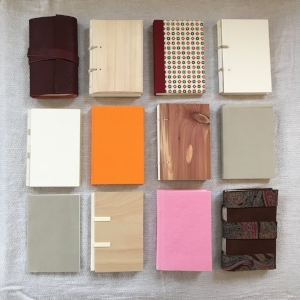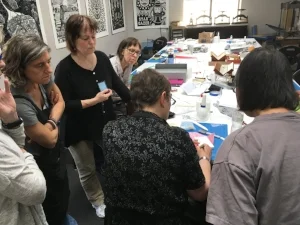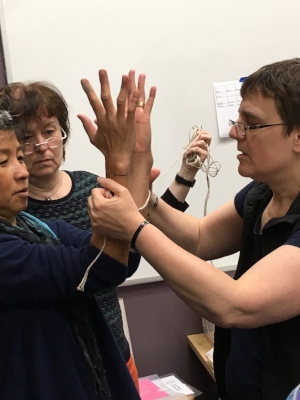Biblio Tech I & II Review by Sarah Songer
Juliayn Coleman
The twelve models completed in class.
I was very fortunate to be one of two HBC members to receive scholarships to Karen Hanmer’s Biblio Tech class, held at the San Francisco Center for the Book in April 2017. Biblio Tech focuses on the making of small binding models of various structures. Each is done as a cutaway, left uncovered and only partially completed, revealing the unique components of each structure so that they may easily be used as guides for future bindings.
Karen’s traveling box of models housed many more than the ten listed in our syllabus, and on the first day we spent a few fascinating hours hearing a little bit about each structure, handling them, and taking photos. Most of the models were ones that I had heard of – mostly on exhibit labels – but knew little about, like the New Oriental and Drum Leaf bindings. Some, like Don Etherington’s method for reattaching boards by simply wrapping the spine and boards entirely in linen, were the sort of thing that seem obvious only after one finds out someone else has already thought of it.
Students watching Karen Hanmer demonstrate a technique.
Even with ample time for demonstration and question-asking, our class of ten moved so quickly through the syllabus that Karen scrounged up enough supplies to teach us two additional models, simply to be sure we felt we got our money’s worth. My personal favorite, despite it being something I would likely never inflict on an actual book, was the Colonial American scaleboard binding. The cover boards are made from thin wood, and rather than being sewn or glued, the textblock is held together by means of a leather thong laced through a chiseled slot parallel to the spine; it’s a very efficient process but not a terribly effective result. It was nice to be reminded that not every book needs to or should be a fine leather-bound extravaganza.
A model completed in class.
We students were binders of all levels and backgrounds with different interests, techniques, and tools. The tools! I had never heard of 1-2-3 machinist’s blocks, Nevanon scissors, or Timothy Moore’s signature punch. People showed off their favorite bones and their tiny brass squares; I ended the week with a wish list far beyond my means. I could not have asked for a nicer group of people to spend the week with. Many thanks to the HBC board for bringing wonderful teachers and advanced workshops to the Bay Area and beyond.
Double raised cord sewing on the frame.
Karen at the sewing frame.
Raised cord sewing demo on a student.
Scaleboard model covered.







